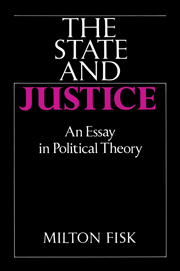Book contents
- Frontmatter
- Contents
- Preface
- Introduction: Can the state rule without justice?
- Part One An outline of a materialist political theory
- Part Two An assessment of the place of justice in the state
- 5 Ideal justice
- 6 Property and justice
- 7 Repression and radical justice
- 8 Justice and materialism
- 9 Equality and liberty
- 10 Class and the limits of control
- Part Three A functional view of political institutions
- Part Four An account of the community of states
- Part Five A reflection on the transition to a new kind of state
- Conclusion: State, class, and democracy
- Notes
- Index
- Frontmatter
- Contents
- Preface
- Introduction: Can the state rule without justice?
- Part One An outline of a materialist political theory
- Part Two An assessment of the place of justice in the state
- 5 Ideal justice
- 6 Property and justice
- 7 Repression and radical justice
- 8 Justice and materialism
- 9 Equality and liberty
- 10 Class and the limits of control
- Part Three A functional view of political institutions
- Part Four An account of the community of states
- Part Five A reflection on the transition to a new kind of state
- Conclusion: State, class, and democracy
- Notes
- Index
Summary
Sometimes classical debates help us with the formulation of contemporary problems. They can have a relevance that transcends the circumstances in which they were initiated. This is certainly true of the debate between Hobbes and Locke on the nature of property. It helps set the problem of how and to what extent state justice can modify the nature of property in the economy the state itself is supposed to perpetuate.
Hobbes and Locke on property
Hobbes takes the view that property is a creation of the state and thus has no place in a period of anarchy. Locke, however, insists that property is at root a private right resulting from the interchange between a private individual and nature. The Lockean view recurs today in libertarian defenses of property against the encroachments of the state. Following in Hobbes footsteps are social democratic views of property that make it dependent on the state.
The political motivations of these views of property are an integral part of their justification. If indeed property is a private right, then it makes sense to say that the role of the state is the protection of property, along with other private rights such as the right to personal security. Property on this Lockean view is a given that the state accepts and supports; there is no justification for an interventionist state that would subvert these antecedent private rights.
- Type
- Chapter
- Information
- The State and JusticeAn Essay in Political Theory, pp. 80 - 91Publisher: Cambridge University PressPrint publication year: 1989



